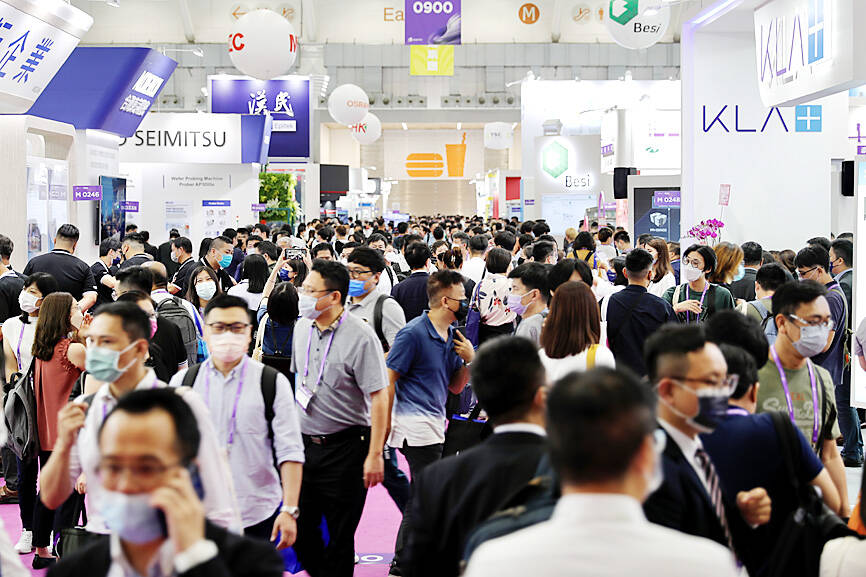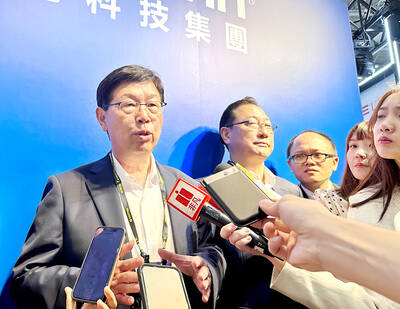The nation’s investment rate is expected to hit a 27-year high this year, as local companies expand production and upgrade technologies, the Directorate-General of Budget, Accounting and Statistics (DGBAS) said last week.
The investment rate — the ratio of capital formation to GDP — is forecast to rise to 27.82 percent this year from 26.96 percent last year, the agency said.
The estimated figure for this year is the highest since 1995, when the ratio reached 28 percent, with the semiconductor industry, led by Taiwan Semiconductor Manufacturing Co (TSMC, 台積電), driving the growth in local investments.

Photo: Ritchie B. Tongo, EPA-EFE
Semiconductor firms have sought to maintain their lead over overseas competitors in high-end technology development, a move that has prompted many downstream manufacturers in the supply chain to invest in Taiwan, the DGBAS said.
The investment growth has also been driven by investors moving operations from China to Taiwan, attracted by government subsidies and concerns over escalating trade tensions between Washington and Beijing, it said.
In addition, the government has aggressively pushed for the development of renewable energy, such as solar energy and offshore wind power, to attract capital investment, it said.
Tallies compiled by the Investment Commission showed that foreign direct investment (FDI) approved by the government for the first 10 months of this year soared 119.36 percent from a year earlier to US$11.56 percent.
Most FDIs were made up of foreign renewable energy developers, including Denmark’s Orsted Wind Power TW Holding A/S, Netherlands-based NP Hai Long Holdings BV and the Denmark-based CI II Changfang K/S, pouring funds into offshore wind development, the commission said.
After the high growth in investments this year, the investment rate for next year is predicted to fall slightly to 27.68 percent, as global demand weakens and the manufacturing sector undergoes inventory adjustments, the DGBAS said.
However, next year’s ratio would reach its second-highest level since 1995, behind only this year’s estimated 27.82 percent, the agency said.
Inventory adjustments faced by the export-oriented manufacturing sector, which began in the second half of this year, are expected to continue into next year, it said.
As a result, the agency has lowered its private investment growth forecast for the fourth quarter of this year by 1.53 percentage points to 4.45 percent and cut its forecast for the whole of next year by 0.39 percentage points to 3.04 percent.

Taiwan Transport and Storage Corp (TTS, 台灣通運倉儲) yesterday unveiled its first electric tractor unit — manufactured by Volvo Trucks — in a ceremony in Taipei, and said the unit would soon be used to transport cement produced by Taiwan Cement Corp (TCC, 台灣水泥). Both TTS and TCC belong to TCC International Holdings Ltd (台泥國際集團). With the electric tractor unit, the Taipei-based cement firm would become the first in Taiwan to use electric vehicles to transport construction materials. TTS chairman Koo Kung-yi (辜公怡), Volvo Trucks vice president of sales and marketing Johan Selven, TCC president Roman Cheng (程耀輝) and Taikoo Motors Group

Among the rows of vibrators, rubber torsos and leather harnesses at a Chinese sex toys exhibition in Shanghai this weekend, the beginnings of an artificial intelligence (AI)-driven shift in the industry quietly pulsed. China manufactures about 70 percent of the world’s sex toys, most of it the “hardware” on display at the fair — whether that be technicolor tentacled dildos or hyper-realistic personalized silicone dolls. Yet smart toys have been rising in popularity for some time. Many major European and US brands already offer tech-enhanced products that can enable long-distance love, monitor well-being and even bring people one step closer to

RECORD-BREAKING: TSMC’s net profit last quarter beat market expectations by expanding 8.9% and it was the best first-quarter profit in the chipmaker’s history Taiwan Semiconductor Manufacturing Co (TSMC, 台積電), which counts Nvidia Corp as a key customer, yesterday said that artificial intelligence (AI) server chip revenue is set to more than double this year from last year amid rising demand. The chipmaker expects the growth momentum to continue in the next five years with an annual compound growth rate of 50 percent, TSMC chief executive officer C.C. Wei (魏哲家) told investors yesterday. By 2028, AI chips’ contribution to revenue would climb to about 20 percent from a percentage in the low teens, Wei said. “Almost all the AI innovators are working with TSMC to address the

FUTURE PLANS: Although the electric vehicle market is getting more competitive, Hon Hai would stick to its goal of seizing a 5 percent share globally, Young Liu said Hon Hai Precision Industry Co (鴻海精密), a major iPhone assembler and supplier of artificial intelligence (AI) servers powered by Nvidia Corp’s chips, yesterday said it has introduced a rotating chief executive structure as part of the company’s efforts to cultivate future leaders and to enhance corporate governance. The 50-year-old contract electronics maker reported sizable revenue of NT$6.16 trillion (US$189.67 billion) last year. Hon Hai, also known as Foxconn Technology Group (富士康科技集團), has been under the control of one man almost since its inception. A rotating CEO system is a rarity among Taiwanese businesses. Hon Hai has given leaders of the company’s six